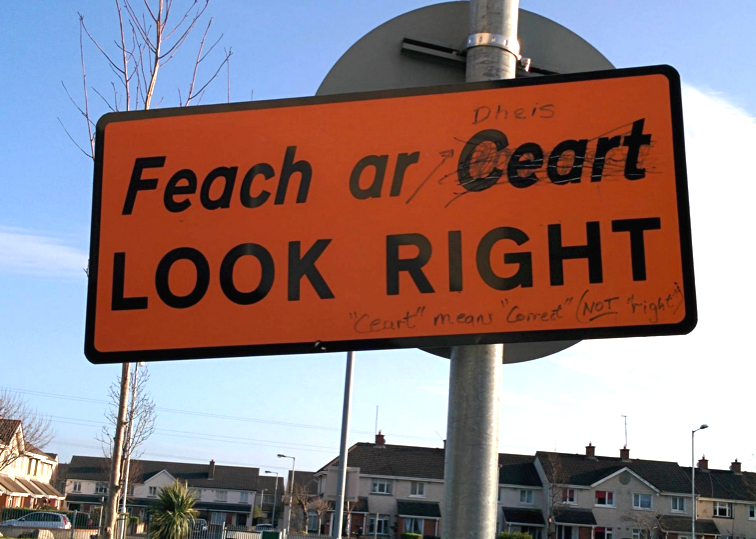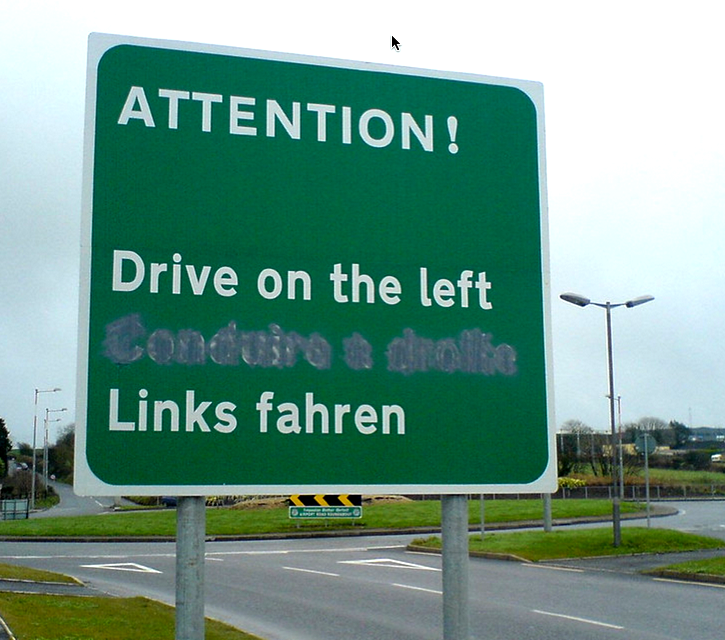Look correct
« previous post | next post »
From reddit, a road sign in Leopardstown that translates English "Look right" to something like Irish "Look at correct":
In the comments, someone linked to a sign near Cork Airport reminding English and German speakers to drive on the left, while advising the French to drive on the right:
[h/t Shane Roberts]


Irina said,
January 25, 2015 @ 1:28 pm
Reminds me of the sign on the bookstall in the main hall of the Delft University of Technology when I had a summer job there (i.e. over 35 years ago, eek!) reading
DICHT
OUVERT
CLOSED
GESCHLOSSEN
i.e. closed in Dutch, English and German, but open in French.
Barrie England said,
January 25, 2015 @ 1:43 pm
Then there was this one: http://news.bbc.co.uk/1/hi/7702913.stm
Micah said,
January 25, 2015 @ 1:49 pm
What would be really amazing would be a sign with both of those errors combined (i.e., in English it said "drive on the left," in French it said "drive on the right," and in Irish it said "drive correctly").
Craig said,
January 25, 2015 @ 1:53 pm
That Welsh email problem (Barrie's comment) reminds me of the story of how the Electric Light Orchestra's first album managed to have the meaningless title "No Answer" in the US. The album isn't supposed to have a title at all aside from the band's name. However, an executive at their American record company wanted to verify the title, so he asked his secretary to call the British record company to inquire. She called, but nobody picked up at the other end (it was probably outside of business hours in the UK), so she wrote "No answer" on her boss's inter-office memo slip and sent it back to him.
Stan Carey said,
January 25, 2015 @ 2:12 pm
Féach is also missing its fada (acute accent), which changes the word's pronunciation. Féach in my Connacht dialect is /ˈfe:əx/, whereas the non-word *feach would be more like /ˈfɒx/.
Edith T said,
January 25, 2015 @ 2:29 pm
A Hungarian tourist travelling by train points out a multilingual sign to his Romanian travelling companion: 'What does the first line say?' '"Danger! Do not lean out the window",' says the Romanian. 'But what does the second line mean?' 'Oh, it's the same, but in French.' 'And the third?' 'Same thing, in English.' 'And the fourth?' 'Its the same again, this time in German.' 'But… I don't understand. Romania and Hungary share a border; there is a sizeable population of ethnic Hungarians in your country – why isn't there a Hungarian translation?' 'Oh, it's okay, you guys can lean out the windows…'
Daniel von Brighoff said,
January 25, 2015 @ 2:52 pm
There's a parallel to the Cork airport sign in central Cardiff: http://news.bbc.co.uk/2/hi/uk_news/wales/north_west/4605768.stm. Someone asked me once which pedestrians they were trying to kill, Anglophones or Cymrophones. The article doesn't say, but I remember reading on a "Scymraeg" website that the English version is the correct one.
Keith said,
January 25, 2015 @ 3:10 pm
I remember seeing a sign outside a supermarket, Tesco, I think, near the channel ports.
"Please come again" was translated for French visitors as "Merci de rappeler" which really means "please phone back".
Michael Rank said,
January 25, 2015 @ 3:34 pm
The Welsh certainly have an unfortunate way with road signs, apart from the one mentioned by Daniel von R, this one does the reverse http://news.bbc.co.uk/1/hi/wales/south_east/8136532.stm
mollymooly said,
January 25, 2015 @ 3:54 pm
The upper, orange, sign is a temporary roadworks sign, so half-assedness is more understandable, if not more forgivable. The lower, green, sign (which was correct in May 2009) is probably the responsibility of Cork Airport, which Should Know Better. Although a green sign-background usually means a "national road", AFAIK the National Roads Authority's remit starts at the roundabout visible in the background.
LMorland said,
January 25, 2015 @ 4:46 pm
Edith T, Your story reminded me instantly of the "Lapin du Métro parisien." As you can see in this photo (found at random on the Internet) https://farm2.static.flickr.com/1330/1391942831_b8403018c8.jpg this warning, posted at a child's height, is very clear about the consequences of sticking your fingers between the doors… IF you read FRENCH, GERMAN, SPANISH or ITALIAN.
Apparently, the little anglophone brats can just take their chances!
Matt said,
January 25, 2015 @ 9:26 pm
In other words, Stan, you're saying they should stop trying to make "Feach" happen?
David Morris said,
January 25, 2015 @ 10:14 pm
Because I have students from right-driving and left-driving, I try to be careful to refer to driving on the 'correct' side of the road here in Australia.
James said,
January 26, 2015 @ 3:45 am
Craig's story of the Electric Light Orchestra "No Answer" album reminds me of one of the most famous works by French composer Pierre Boulez. Boulez had been commissioned by the Ulm festival to write a piece, and when they wrote to enquire about the details he attempted to convey in imperfect German that he didn't have a title yet but that it was a setting of poetry by E.E.Cummings. The upshot of the exchange was that the festival advertised the new work under the name "Cummings ist der Dichter", and Boulez liked the accidental title enough to keep it.
Stan Carey said,
January 26, 2015 @ 4:38 am
@Matt: That's right, and also correct.
richardelguru said,
January 26, 2015 @ 7:46 am
@ Stan
As someone who learned to drive in the UK and now lives in the US, I have a tendency say that while the Americans drive on the right side, the British drive on the correct side.
Joseph F Foster said,
January 26, 2015 @ 9:00 am
Maybe the sign maker took account of the French tendency to take their half out in the middle?.
bks said,
January 26, 2015 @ 11:19 am
I have in front of me the 2003 Latin American Spanish phrasebook from Lonely Planet. In the section on Food, methods of preparation (p. 148) it recommends muy hecho for well-done which does not work at all at the restaurante.
Chris C. said,
January 26, 2015 @ 7:24 pm
Maybe they just wanted all passers-by to comb their hair.
Harry Campbell said,
January 26, 2015 @ 10:30 pm
@bks What exactly is wrong with "muy hecho" for meat? I don't understand.
More on look right/left:
https://www.flickr.com/photos/flipdrivel/3332481689/
JT the Ninja said,
January 27, 2015 @ 11:38 am
I have a co-worker who, for the longest time, had the last name on his Facebook as "None." When he signed up for his account way back near the site's beginnings, he didn't want to enter a last name or have one displayed, preferring to go by his online (mononymous) alias. So he contacted support, and when they asked him what to put for his first name, he replied "None." Sure enough, that's what they entered.
bks said,
January 27, 2015 @ 5:24 pm
@Harry Campbell I was told that correct is bien cocido, but I am not fluent in Spanish.
–bks
Francisco said,
January 29, 2015 @ 4:56 pm
@Harry Campbell, @bks, "bien asada". "Bien hecho" (a word-by-word translation of well done) will also do.
James said,
January 30, 2015 @ 11:43 pm
I know a fellow whose mother named him JD Smith, just the initials (long story). When he joined the army and received his fatigues, the ID strip over the breast pocket read "Jonly Donly Smith."
Chas said,
January 31, 2015 @ 2:52 am
@ James: It took me a while to get that, but I would guess that when they asked him what his first name was, he said, "It's J only, then D only." J[ɑː]nly D[ɑː]nly has a nice ring to it though :)
Yuval said,
February 1, 2015 @ 9:26 pm
In Eilat there's a sign declaring part of the sea "Swimming area, boating forbidden" in Hebrew and "Boating area, swimming forbidden" in both English and Arabic.
Pete said,
February 2, 2015 @ 11:15 am
Oddly enough, in Scottish Gaelic the word for "right" (as opposed to "left") genuinely is ceart. I noticed this when I moved to Scotland from Ireland and have always supposed it to be the result of an English-influenced confusion of exactly the same sort you see in the Leopardstown sign above.
Nick said,
February 3, 2015 @ 5:06 am
@ James: Are you a fan of the comedian Henry Cho by any chance or is that an old joke? https://www.youtube.com/watch?v=U7_3xxQXgFs (1 minute)